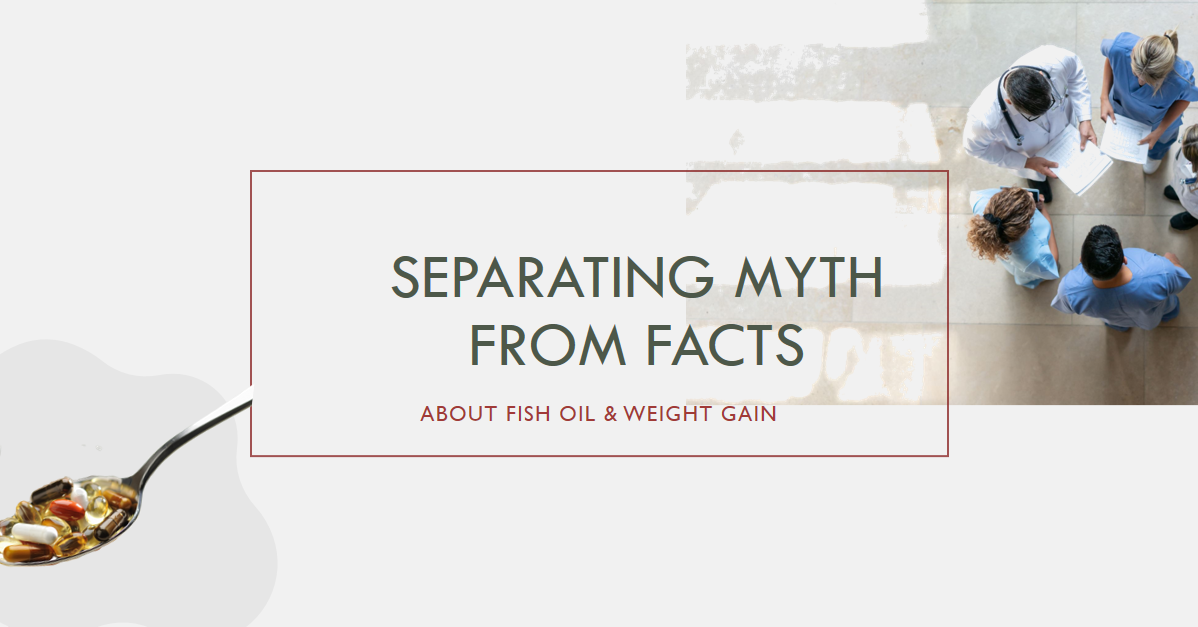Fish oil has recently gained a lot of popularity due to its versatility and potential health benefits. It consists of healthy fats, the good ones, called Omega-3 EPA (eicosapentaenoic acid), Alpha-linolenic acid (APA) and DHA (docosahexaenoic acid).
These long-chain polyunsaturated fatty acids exist in high levels in cold-water fish, some algae, and shellfish. They are also found in some plants and nuts.
You will be interested to know that the human body does not produce Omega-3 EPA and DHA naturally but it needs them in substantial volume to develop, promote, and function bodily activities at every stage of life, from foetal stage to old-age.
These essential Omega-3 fish oil fatty acids prevent heart diseases, promote brain functionality, and maintain overall mental and physical well-being. Amid so many highlights, myths and misinformation are creating overwhelming confusion. The one major myth that we will talk about is, that fish oil leads to weight gain in men, women, and even kids.
We are going to delve into the facts and myths about fish oil, weight gain, and other myths regarding it so you get a better understanding before adding it to your diet. Additionally, we will shed light on what constitutes fish oil.
Fish Oil Constitution:
- Unsafe – Myth or Fact?
Fish oil is mainly composed of Omega-3 fatty acids:
- EPA (eicosapentaenoic acid) – is found in cold-water fatty fish like salmon, tuna, mackerel, sardines, etc.
- DHA (docosahexaenoic acid) – is also found in cold-water fatty fish like salmon, tuna, mackerel, sardines, etc.
- ALA (alpha-linolenic acid) – is found in sources that are plant-based like chia seeds, flaxseeds, walnuts, and algae.
Omega-3 “fatty” acids are healthy, good fats. Whenever we hear the word ‘fat’ we think of overweight, obesity, and unnecessary weight gain assigning great negativity to the term.
Fortunately, such is not the case with Omega-3 DHA and EPA fatty acids. They tend to focus more on regulating hormones, maintaining healthy skin cells, easing joint pain and stiffness as well as providing ample gut support.
They do not make you gain weight.
- Manage Weight – Myth or Fact?
If Omega-3 fatty acids in fish oil do not make you gain weight than does it help reduce it? Let’s get one thing straight, just as no two bodies and their needs are alike exactly like fish oil does not give the same result to each individual.
However, fish oil will affect your body depending on various factors consisting of age, separate nutritional needs, deficiencies, illnesses, mental health, and overall health status. Despite that, fish oil aids in weight reduction.
To specify, fish oil is more common in reducing waist circumference. This does not necessarily mean that you will drop kilos/pounds of weight by using fish oil but it will decrease your abdominal fat.
With the help of Omega-3 fatty acids infused fish oil, you can control obesity as well. It’s essential to know that fish oil alone will not help you in reducing your waist size. A lifestyle change and simple dietary altercations can potentially boost your weight loss journey.
- Reduce Abdominal Fat – Myth or Fact?
We’ve established that fish oil doesn’t necessarily reduce weight but it helps in reducing belly fat and waist circumference. How exactly does it do that?
Omega-3 fatty acids DHA and EPA in fish oil have inflammatory properties. It also helps in easing chronic inflammation which is related to the risk of obesity and many other health issues related to heart and the digestive system.
In addition, fish oil consecutively burns unwanted fat around your stomach and helps in transforming it into muscles. More than reducing weight, as mentioned earlier, fish oil builds muscles by turning the fat into muscle mass.
Fish oil also has properties that balance gut support, promotes the gut micro-biome to enhance the gut health which in turn makes losing weight much faster and easier. So, even though fish oil doesn’t make you lose weight but it significantly provides assistance and the boost needed to accomplish your weight loss journey.
Lastly, it’s also important to state that it matters how much fish oil you consume on daily/weekly/monthly basis. There are many factors that work in for fish oil to do its magic. Read further to know more.
Adequate Fish Oil Consumption
It’s ascertain that fish oil plays a great role in the reduction of your waist circumference. Now to understand the properties of fish oil even further let’s delve into how much you should consume depending on your age. According to NAM National Academy of Medicine, the percentage of Omega-3 DHA, ALA and EPA (either through fish oil or fish oil supplements) for male, female, infants and older kids are as follows:
- From infancy to 1-year of age – 0.5 grams
- From 1 to 3 years old – 0.7 grams
- From 4 to 8 years – 0.9 grams
- From 9 to 13 years – 1 to 1.2 grams
- From 14 to 50 years – 1.1 to 1.6 grams
- 51+ years – 1.1 to 1.6 grams
- Pregnant women – 1.4 grams per day
- Nursing mothers – 1.3 grams per day
More essentially, always speak to your doctor before adding fish oil or fish oil supplements to your diet. Based on your medical history, healthcare professionals will guide you best whether to intake fish oil and in how much of an amount.
Regardless how much information there is out there about fish oil, no one other than a doctor will consider all the factors that might affect your pre-existing condition of health by the intake of fish oil. It’s always better to be safe than sorry.
In Conclusion
Fish oil has the beneficial nutrients provided by Omega-3 fatty acids in the form of DHA and EPA. Apart from helping in losing abdominal weight and reducing waist size, there are other benefits to consuming fish oil like managing arthritis, prevent COVID-19 symptoms, and boost eye health and lower blood sugar levels.
However, we believe it’s important to do a thorough research before you make any dietary changes including fish oil. Being informed will let you meet your Omega-3 needs efficiently, be it through fish oil or even fish oil supplements.
We recommend consulting a healthcare professional but also separating myths from facts for better overall mental and physical health.

